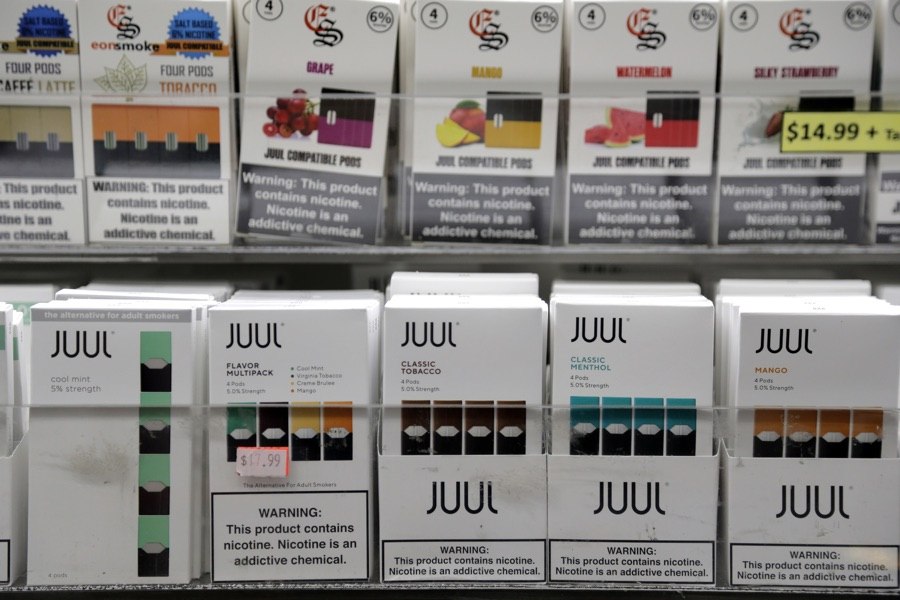Mayor Kenney Proposes Vaping Legislation to Protect Minors
The bill would restrict minors' access to flavored e-cigarettes, but keep them available — in specialized stores — to everyone else.

A proposed vaping law would change where e-cigarette brands like Juul are sold in Philly. Photo by Seth Wenig/AP.
In response to a nationwide outbreak of vaping-related lung disease that has sickened 1,300 people and resulted in 26 deaths, Mayor Jim Kenney announced on Wednesday new legislation aiming to limit minors’ exposure to e-cigarettes.
Kenney outlined a two-pronged proposal: First, a citywide education campaign to inform young people of the dangers of vaping, and second, a new bill that would ban the sale of flavored (that is to say high-nicotine) e-cigarettes in stores that admit minors.
The bill, as currently written, would force any e-cigarette product with more than 20 milligrams of nicotine per milliliter into adult-only stores. In Europe, that’s the maximum amount of nicotine allowed under the law. But in the U.S., higher formulations are common: The e-cigarette brand Juul, for instance, sells a product that is three times stronger than the European limit. Those e-cigarettes and vape pods would still be available in Philly, but only at stores that deny entry to anyone under 18 years of age.
At a press conference on Wednesday, city health commissioner Tom Farley noted that 25 percent of high school seniors in Pennsylvania currently use e-cigarettes. (For comparison, less than five percent of the adult population currently vapes.) While the rate of teen vaping was previously declining in the state, the figure doubled from 2017 to 2019. “These teens are not smokers trying to quit,” Farley said, referencing the traditional argument made in favor of e-cigarettes. “These are kids getting addicted to an entirely new product.”
Still, Philly’s proposed vaping regulation raises a couple of questions. Chief among them: How much of a tightened regulation is this, really? E-cigarette sales to minors — of all types, high nicotine concentration or not — were already banned by then-Mayor Michael Nutter back in 2014. It would seem, then, that the city’s problem is one of compliance and enforcement of its existing laws more than anything else. (The rise of illicit online vaping marketplaces hasn’t made things any easier for the city.)
You also have to wonder, if the wave of sickness spreading across the country is affecting people of all ages, why does the bill focus on minors? According to the Centers for Disease Control, the median age of those who have died from vaping-related illness is 49 years old. And of those to fall ill, the median age is 24 years old. Twelve Philadelphians have gotten sick from vaping, according to the Health Department.
“There is some value to e-cigarettes, so that’s why this is a balanced bill,” Farley said. “The e-cigarette products that are less dangerous would still be available, and the other version would be available in these specialized shops. That is the balance we’re striking.”
Other states have sought to strike different balances. Montana, Oregon, Rhode Island and Washington have all issued temporary bans of flavored e-cigarettes across all age groups. Massachusetts temporarily banned all e-cigarette products, period. (A similar proposed ban in Michigan was just halted by a judge.) These various efforts all come against the backdrop of a Trump administration that has, despite publicly floating the idea of a federal ban of flavored e-cigarettes, done nothing yet.
Brian Jenssen, a pediatrician at CHOP who specializes in tobacco policy, says that while the more aggressive bans could be promising, there’s no evidence yet that they’re effective. Philadelphia’s more moderate proposal is an appropriate first step in his view: “We do know there’s evidence that trying to restrict marketing, sales, flavor, and access to teens makes a dent.”
The fact remains that all vaping bans are something of a guessing game. Even the CDC notes that it has “not identified the cause or causes of the lung injuries in these cases.” One possible culprit could be THC cartridges: Seventy-five percent of patients with pulmonary illness reported using THC vapes — often sold on the black market, either in person or online — prior to falling ill. (The CDC currently recommends that no one use vape products containing THC.)
But others appear to have gotten sick using plain nicotine e-cigarettes. “No one knows what’s in any of these products,” Farley said. “Even the FDA doesn’t know, because the FDA has not required manufacturers to submit a list of ingredients.”
Should the city’s proposed bill pass, the only real difference for minors would be that high-nicotine, flavored e-cigarettes would no longer be sold at corner stores. The Heath Department says that will ultimately reduce access, since those same corner stores are often the source of under-the-table sales.
“This bill well help the problem, but the city can’t protect people from everything,” Kenney said. “We need parents who can educate our children about the risk that comes with certain products.”
Farley framed the legislation as an initial response. “As new information arises, we may need additional action,” he said. “But this will go a long way toward protecting our children from an irresponsible market of corporations looking only for profit.”


